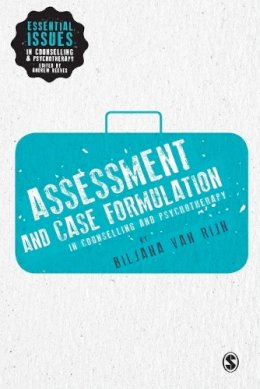
Assessment and Case Formulation in Counselling and Psychotherapy
Biljana Van Rijn
John Rowan, humanistic therapist, private practice
‘This is a must-read book for students on courses in counselling, psychotherapy, clinical psychology and psychiatry.’
Heather Fowlie, Head of the Transactional Analysis Department, Metanoia Institute, London
Conducting a competent assessment and case formulation can be a daunting task for trainee therapists engaging in clinical assessment for the first time. This book is designed to help, by unpicking the many aspects involved in assessment and case formulation across modalities, practice settings and client groups.
The book:
· Explores key elements of clinical assessment including diagnosis, risk assessment, ethical considerations and accounting for difference.
· Highlights the necessary skills, techniques and legal requirements at each stage of the process.
· Takes into account the impact of culture, context and theoretical and practical considerations.
· Uses case studies and reflective questions to illustrate difficult concepts in context.
Equipping you with the knowledge and tools to make successful assessments and case formulations, this is an essential read for trainees and for qualified practitioners wishing to brush up on their understanding.
Dr Biljana van Rijn, Faculty Head of Applied Research and Clinical Practice, Metanoia Institute.
Product Details
About Biljana Van Rijn
Reviews for Assessment and Case Formulation in Counselling and Psychotherapy
John Rowan Assessment and Case Formulation in Counseling and Psychotherapy is a must read book for students on courses in counselling, psychotherapy, clinical psychology and psychiatry. It is equally useful for experienced practitioners who might benefit from revisiting and reflecting on the many aspects of clinical practice that are covered in this very practical and comprehensive handbook. Up to date and easy to read, Dr Van Rijn has drawn upon her extensive clinical experience in the field of counseling and psychotherapy, as a practitioner, trainer and supervisor as well as current research to illustrate and convey the various aspects of a good assessment. Based within and drawn out from a relational perspective, this book takes the reader through the many aspects involved in assessment and case formulation, such as diagnosis, risk assessment, ethical considerations and accounting for difference and then, seamlessly through a series of case studies and questions, designed to help the reader reflect upon their work and to deepen their ability to conduct thorough assessments. This is a book I will be recommending to students and colleagues alike.
Heather Fowlie
